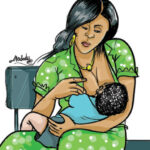The issue of babies crying at night which makes parents sleepless has been worrisome to many people, especially when the baby is the first.
The News Agency of Nigeria (NAN) reports that many parents have to be awake and continue to devise different means to keep babies calm while thinking of why the infant cries or what he or she wants.
- Rail track vandalism: Police arrest 5 suspects in Kaduna
- Abducted Katsina worshippers recount ordeal with kidnappers
This is because, some babies cry at night and sleep during the day, leaving parents and family members tired and wondering what the problem is, with some thinking that the baby has pains on the umbilical cord or having a stomach ache, among others.
Mrs Fatima Umar, a businesswoman and mother of two living in Abuja, said whenever she was due for delivery, her major worry was the sleepless nights because both her children cried nonstop every night from birth up until three months.
She said, “sometimes I used to wonder if my baby is seeing something that I don’t see that is making him cry so much.
“When I had my second baby, I even took him to our chief Imam to pray for him because I didn’t understand why he would continue to cry once it was 2 a.m. till around 4.30 a.m. or 5 a.m.
“My neighbour kept assuring me that he would stop and I just endured and got used to it and as soon as he was three months, the crying stopped and we could sleep throughout the night.”
Umar, who said she still could not understand why some babies cry at night, added that “without any medication, they would stop when the time comes.
“However, what is it that makes them cry so much that does not need medication?” she asked.
Mrs Amaka Njoku, a civil servant and mother of five who also lives in Abuja, said all her children cried at night and she got used to it and just needed to put the things she needed for the sleepless nights.
Njoku said that when she had her first daughter, there was a day she took her to the clinic near her house twice at night when she couldn’t endure the crying but the nurses examined her and said nothing was wrong with her.
She added that when she told her female colleagues, many said they experienced the same and advised her to just make the baby comfortable and wait for when the crying would stop.
However, Dr Eziechila Ressie, a Consultant Paediatrician with the Federal Medical Centre, Jabi, Abuja, said newborn babies often cry at night because of the air they swallow alongside breast milk.
She told NAN on Sunday in Abuja that night cries by babies of between one month and three months had been the commonest complaints by mothers, adding that “it is common especially among new or first-time mothers.”
According to her, one of the reasons babies cry at night is because they are able to take in a lot of milk and they are aggressive in their feeding.
“And they are not able to coordinate the swallowing of breast milk and swallowing of air; they breathe in and swallow at the same time and have the problem of swallowing a whole lot of food alongside air,” she said.
She explained that the air the baby swallowed usually did not get absorbed into their system.
She added that “because the baby’s intestine is narrow as the air passes, it dilates and cause pain because of the volume of milk and air they consumed and they experience a lot of colics.”
She said that some babies have pain more than others.
She also explained that babies cry more at night because during the day when mothers feed them,
they carry them until they belch.
“They put them on the shoulder and make them belch but at night the mothers are tired as nobody has the time to hold the baby for that long.
“In fact, some mothers feed their babies while laying down and as they feed, the mothers are sleeping and nobody has time to keep the baby up for a long time to belch.
“So, all the gas that the baby swallowed while feeding must go down the intestine, causing dilation.”
She stated that the problem most children had at night was because the mothers don’t make the air escape through the mouth.
She said “around three months of age, the pain subsides very significantly and this happens because babies are able to manage the pain, secondly they are able to coordinate swallowing milk and air.
“So, they suck in less air compared to the initial time and again, we teach mothers breastfeeding technique by ensuring a large portion of the areola is into the babies mouth.”
Meanwhile, Mrs Akueshi Uchechi, a Senior Nursing Officer at FMC Jabi, Abuja, said that often when babies cried, parents should find out what happened by checking the diaper.
According to her, it is important to change the baby’s diaper often and when the baby continues to cry, then feed.
She advised mothers to sleep when babies were sleeping, adding that a new mother would usually need help so as not to enter into postpartum depression. (NAN)

 Join Daily Trust WhatsApp Community For Quick Access To News and Happenings Around You.
Join Daily Trust WhatsApp Community For Quick Access To News and Happenings Around You.


